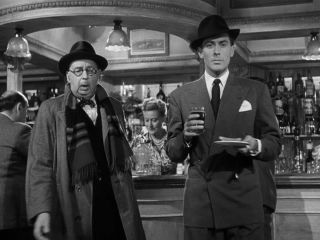The MacGuffin: News and Comment (31/May/2008)
(c) Ken Mogg (2008)
May 31
Hitchcock's Stage Fright, which I started to discuss last week, has Eve Gill as its central character. Eve, the screenplay tells us, 'feels all the world's a stage. and, come hell or high water, she's going to act on it!' Moreover, 'in so doing she really grows up, manages to fall in love, and learns that adventure in the mind or behind the footlights is much easier than in actuality!' Like other 'picaresque' adventure films and stories, of which the greatest may be Stanley Kubrick's Barry Lyndon (1975), the ultimate referent for Stage Fright is the life-journey itself. In keeping with this picaresque motif, Eve tells her father that he and Captain Kidd are her heroes - and the screenplay adds that the Commodore 'fancies himself an eccentric adventurer who might be straight out of the pages of R.L. Stevenson [presumably 'Treasure Island', inspired by Kidd's doings]'. Of course, Hitchcock's film is also 'full of psychology' (his own phrase describing the kind of stories he liked), which is something he probably got from novelists like Charles Dickens and John Buchan - who in turn both owed an immense debt to John Bunyan's picaresque parable, 'Pilgrim's Progress' (1678). But let's come to Stage Fright itself. Each of its characters wants love and appreciation, though some are more in touch with reality than others. The most effective are those who not only have dual-mindedness (see last time) but are able to see and articulate it (as a good film director must). There's a rather good gag about this in the film's first pub scene (see frame-capture below). Eve had followed Detective-Inspector Smith (Michael Wilding) there, hoping to be able to engage him in conversation about the Inwood murder. She uses her acting talents to feign a case of illness, and in due course a concerned Smith joins her at her table. At the end of the scene, he apologised to her for having 'manoeuvred' their meeting! ('Wheels within wheels', as Eve speaks of later, about life's pattern.) Another lesson of the film is that love and appreciation may indeed be attained, but that there will be disappointments. Eve does have her big moment, the equivalent of her time in the spotlight, after she has performed superbly to trick Charlotte into a confession (in front of a concealed microphone). But her sole appreciation for now comes from her father, who silently applauds her. (The Commodore, who in an earlier scene had joked, 'At last we are alone and unobserved!', stands in for the love and applause of the wider world to which Eve may, or may not, finally accede.) By contrast, Charlotte, the professional performer, seems almost bored with life, perhaps because she has been sated with luxury and applause, but has missed out on real love. (Hence her number 'The Laziest Gal In Town'.) In speaking of her murdered husband, she compares him to a dog to whom she gave love but who had turned around and bitten her. She can't help but invoke melodrama as she comments, 'It's as if my mother had struck me in the face!' But that piece of melodrama carries psychological weight, nonetheless. (Still, let's be clear about Charlotte: however ambiguously, she is the film's guiltiest party, a victim of others but also victimising Jonathan in turn. At the climax, Jonathan will tell Eve, 'They'll hang [Charlotte] too, for planning it.') As for the Commodore, he has a revealing line: 'If there's one thing I cannot bear, it's insincerity!' He's clearly an eccentric - if we were all like him, we might all be as isolated as him and complaining that we are not appreciated! The script tells us that he lives alone 'because he long ago realised he and his wife were merely a mutual annoyance society'. I take this to imply that the rather humourless Mrs Gill wasn't able to give the Commodore an appreciation of his frank and, yes, impractical turn of mind. In turn, we can say of her that she, too, is isolated, living in a world of her own, but at least, in her sweet, ladylike way, she does run an efficient genteel household for Eve and herself (with the help of a servant or two). In sum, Stage Fright gives us one of Hitchcock's 'representative cross-sections of society'. In theory, it should have been even more engaging than it is. But for all of its ingenuity and humour (worth another item here next time, possibly, in which I'll further sum up), the film never attains a sense of urgency, or of anything very substantial being at stake.
This material is copyright of Ken Mogg and the Hitchcock Scholars/'MacGuffin' website (home page) and is archived with the permission of the copyright holder. |

